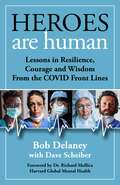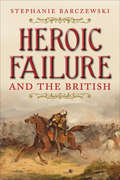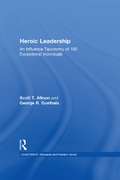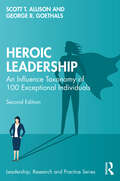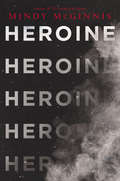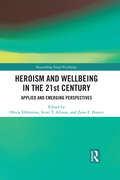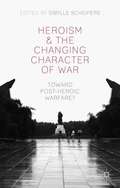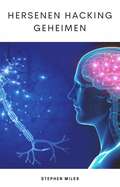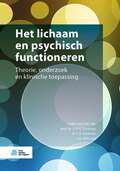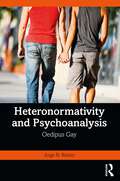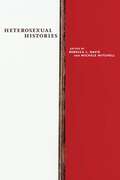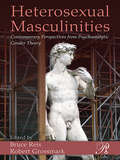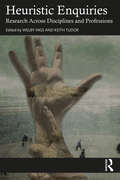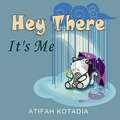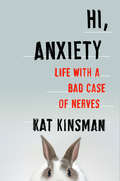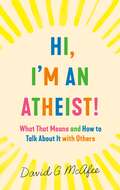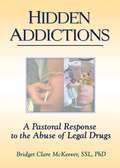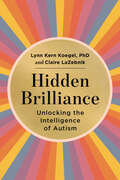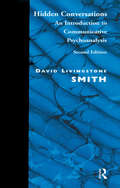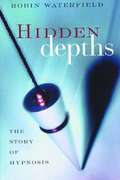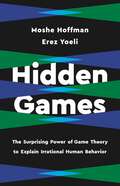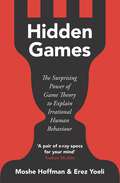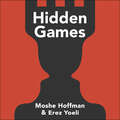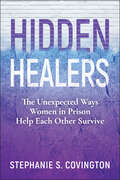- Table View
- List View
Heroes Are Human: Lessons in Resilience, Courage, and Wisdom from the COVID Front Lines
by Bob DelaneyIn Heroes are Human: Lessons in Resilience, Courage and Wisdom from the COVID Front Lines, we read gripping first-hand accounts by those thrust into the depths of the crisis.This book is a must-read for health care workers who have been besieged by the ongoing pandemic, for those who love them, and for any reader wanting to gain a deeper understanding of their immense sacrifices and struggles. Heroes are Human also offers invaluable self-care insights in the face of trauma. The book&’s central voice and guide, Bob Delaney, is an internationally respected and experienced figure in the field of post-traumatic stress. His powerful message to front-line caregivers is that they are not alone. Delaney, along with co-author and award-winning journalist Dave Scheiber, published Covert: My Years Infiltrating the Mob (Sterling Publishing, 978-1-4027-5442-2, Hardcover, 2008; 978-1-4027-6714-2, trade paper, 2009) and Surviving the Shadows: A Journey of Hope into Post-traumatic Stress (Sourcebooks, 978-1-4022-6355-2, 2011). Covert is the true story of Delaney&’s undercover life in a landmark 1970s Mafia investigation, dubbed &“Project Alpha,&” for which he risked his life wearing a wire as a young New Jersey State Trooper, taking on a new identity as a mob associate. He also writes about his overcoming PTSD through the sport of basketball, and career as an elite NBA referee. Surviving the Shadows tells the stories of brave men and women whose lives were plunged into despair by post-traumatic stress but who learned to cope, with Delaney&’s help, by sharing their struggles with others who underwent similar trauma. For more than a quarter of a century, Delaney was a fixture as a referee on the hardwood courts of the National Basketball Association (NBA). But what Delaney did—and has done—off the courts defines his true legacy: It is his less visible, life-saving work of the last four decades, helping active members and veterans of the U.S. armed forces, law enforcement, fire fighters, and first responders—the often under-appreciated heroes who put their lives on the line for the rest of us every day—cope with the devastating effects of post-traumatic stress. Delaney comes by his healing wisdom from hard-won experience. He learned about PTSD first-hand, developing the condition after emerging from his grueling and prolonged undercover work. Helping others suffering from the debilitating effects of post-traumatic has been a driving force in his life. Former President Barack Obama and senior-ranking military leaders have honored Delaney for his contributions to PTSD awareness—stemming from his multiple visits with U.S. troops in Iraq and Afghanistan, and throughout Europe, Asia, and the United States. In addition, Delaney was twice awarded the U.S. Army Outstanding Civilian Service Medal, presented by General Raymond T. Odierno (retired U.S. Army Chief of Staff) and Four-Star General (ret.) Robert W. Cone. In 2020, the NCAA bestowed its highest honor on him: the Theodore Roosevelt Award, previously given four U.S. presidents (Dwight Eisenhower, Gerald Ford, George H.W. Bush and Ronald Reagan). More recently, Delaney has become deeply involved with the prestigious Harvard Global Mental Health initiative, which focuses on traumas and psychological burdens experienced throughout the world.
Heroes and Heroines
by Antonia FraserShort biographies of ancient and modern heroes and heroines, some mythological and some real.
Heroic Failure and the British
by Stephanie BarczewskiFrom the Charge of the Light Brigade to Scott of the Antarctic and beyond, it seems as if glorious disaster and valiant defeat have been essential aspects of the British national character for the past two centuries. In this fascinating book, historian Stephanie Barczewski argues that Britain's embrace of heroic failure initially helped to gloss over the moral ambiguities of imperial expansion. Later, it became a strategy for coming to terms with diminishment and loss. Filled with compelling, moving, and often humorous stories from history, Barczewski's survey offers a fresh way of thinking about the continuing legacy of empire in British culture today.
Heroic Leadership: An Influence Taxonomy of 100 Exceptional Individuals (Leadership: Research and Practice)
by George R. Goethals Scott T. AllisonHeroic Leadership is a celebration of our greatest heroes, from legends such as Mahatma Gandhi to the legions of unsung heroes who transform our world quietly behind the scenes. The authors argue that all great heroes are also great leaders. The term ‘heroic leadership’ is coined to describe how heroism and leadership are intertwined, and how our most cherished heroes are also our most transforming leaders. This book offers a new conceptual framework for understanding heroism and heroic leadership, drawing from theories of great leadership and heroic action. Ten categories of heroism are described: Trending Heroes, Transitory Heroes, Transparent Heroes, Transitional Heroes, Tragic Heroes, Transposed Heroes, Transitional Heroes, Traditional Heroes, Transforming Heroes, and Transcendent Heroes. The authors describe the lives of 100 exceptional individuals whose accomplishments place them into one of these ten hero categories. These 100 hero profiles offer supporting evidence for a new integration of theories of leadership and theories of heroism.
Heroic Leadership: An Influence Taxonomy of 100 Exceptional Individuals (Leadership: Research and Practice)
by George R. Goethals Scott T. AllisonHeroic Leadership is a celebration of our greatest heroes, from well-known legends to the legions of unsung heroes who transform our world quietly behind the scenes. Now in its second edition, this book offers a compelling conceptual framework for understanding heroism and heroic leadership, drawing from theories of great leadership and heroic action.With over 50 revised heroic leader profiles, and 30 new profiles of individuals that have transformed the world, the book explores the many counterintuitive ways that heroes lead, shape, and mobilize their followers. The authors offer a definition of heroic leadership that explains how people easily misconstrue both leadership and heroism, and provide an innovative take on why people are drawn to heroic leaders, and why this can be considered a “fatal attraction”. Incorporating the latest theory and research, the authors unpack the following ten categories of heroism: trending heroes, transitory heroes, transparent heroes, transitional heroes, tragic heroes, transposed heroes, transitional heroes, traditional heroes, transforming heroes, and transcendent heroes. From within these categories, the authors identify 100 exceptional individuals, describing their lives and how they exemplify the characteristics of the category they have been assigned.Suggesting that our most cherished heroes make for our most transforming leaders, this is a vital resource for students and scholars of leadership studies, organizational behaviour and social psychology. Presenting valuable insights into the lives of both historical and modern leaders, the book is also a fascinating read for casual readers.
Heroine
by Mindy McGinnisAn Amazon Best Book of the Month! A captivating and powerful exploration of the opioid crisis—the deadliest drug epidemic in American history—through the eyes of a college-bound softball star. Edgar Award-winning author Mindy McGinnis delivers a visceral and necessary novel about addiction, family, friendship, and hope. When a car crash sidelines Mickey just before softball season, she has to find a way to hold on to her spot as the catcher for a team expected to make a historic tournament run. Behind the plate is the only place she’s ever felt comfortable, and the painkillers she’s been prescribed can help her get there.The pills do more than take away pain; they make her feel good. With a new circle of friends—fellow injured athletes, others with just time to kill—Mickey finds peaceful acceptance, and people with whom words come easily, even if it is just the pills loosening her tongue.But as the pressure to be Mickey Catalan heightens, her need increases, and it becomes less about pain and more about want, something that could send her spiraling out of control.
Heroism and Wellbeing in the 21st Century: Applied and Emerging Perspectives (Researching Social Psychology)
by Scott T. Allison Olivia Efthimiou Zeno E. FrancoOffering a holistic take on an emerging field, this edited collection examines how heroism manifests, is appropriated, and is constructed in a broad range of settings and from a variety of disciplines and perspectives. Psychologists, educators, lawyers, researchers and cultural analysts consider how heroism intersects with wellbeing, and how we still use—and even abuse—heroism as a vehicle to thrive and prosper in the everyday and in the face of the most unbearable situations. Highlighting some of the most pressing issues in today’s world—including genocide, racism, deceitful business practices, bystanderism, mental health, unethical governance and the global refugee crisis—this book applies a critical psychological perspective in synthesizing the social construction of heroism and wellbeing, contributing to the development of global wellbeing indicators and measures.
Heroism and the Changing Character of War
by Sibylle ScheipersPost-heroism is often perceived as one of the main aspects of change in the character of war, a phenomenon prevalent in western societies. According to this view, demographic and cultural changes in the west have severely decreased the tolerance for casualties in war. This edited volume provides a critical examination of this idea.
Hersenen Hacking Geheimen
by Stephen MilesGeheimen die de professionals gebruiken om hun hersens te optimaliseren! Hersenen Hacking Geheimen: leren versnellen en op hetzelfde moment IQ, productiviteit, geheugen en focus verhogen Geheimen die de professionals gebruiken om hun Hersenen te optimaliseren! Met tientallen jaren aan beproefde strategieën laat dit e-boek u de snelste en meest effectieve manier zien om uw geheugen te upgraden. U leert hoe U de cognitie kunt verbeteren en het IQ kunt stimuleren in slechts een paar uur. Niet alleen dat, maar u zult meer gefocust zijn, meer en meer energie bereiken dan ooit tevoren. Wilt u weten hoe de beste en slimste ter wereld op zulke hoge niveaus presteren? Zelfs als u slechts een gemiddelde intelligentie hebt, kunt u ook de geheimen om dit soort prestaties te bereiken leren. In deze gids leert u beproefde technieken om uw geheugen te verbeteren. Wat is inbegrepen: - Efficiënt en snel trainingsprogramma. Productiviteit verhogen - Vergroot het geheugen. - meer focus - Verhoog de algehele intelligentie. + Veel meer! Als je je hersenen op de best mogelijke manier wilt trainen, dan is dit boek iets voor u.
Het lichaam en psychisch functioneren: Theorie, onderzoek en klinische toepassing
by E.H.M. Eurelings C. G. Kooiman M. H. LubDit boek helpt behandelaren in de geestelijke en somatische gezondheidszorg om volwaardige en volledige patiëntenzorg te bieden, met aandacht voor de hele mens, als bezield én belichaamd wezen. Met geïntegreerde kennis over de rol van het lichaam bij psychische problemen, biedt het handgrepen voor het handelen in de klinische praktijk. Het lichaam en psychisch functioneren gaat uit van een breed perspectief op de relatie tussen lichaam en geest in de psychiatrie en de psychologie. Er komt dan ook een grote variëteit aan onderwerpen aan de orde. Allereerst worden verschillende psycho-biologische modellen beschreven. Dan volgt een drieluik over de rol van lichamelijkheid in de verschillende levensfasen. Ook wordt de rol van het lichaam bij een aantal specifieke psychiatrische beelden beschreven. Uiteraard is er aandacht voor de rol van het lichaam bij behandeling en voor leefstijlfactoren. Tot slot biedt het boek naast een somatisch en psychologisch perspectief op de verwevenheid van lichaam en psyche, ook een filosofische en theologische visie. Liesbeth Eurelings-Bontekoe is klinisch psycholoog/psychotherapeut en emeritus bijzonder hoogleraar Beroepsopleidingen tot psycholoog in de individuele gezondheidszorg. Kees Kooiman is psychiater en psychoanalytisch psychotherapeut, werkzaam bij GGZ de Viersprong, specialist in persoonlijkheid, gedrag en gezin. Marike Lub-Moss is klinisch psycholoog en zij was werkzaam als hoofd van de afdeling Medische Psychologie van het Haaglanden Medisch Centrum in Den Haag. Samen vormen zij de redactie van dit boek.
Heteronormativity and Psychoanalysis: Oedipus Gay
by Jorge N. ReitterHeteronormativity and Psychoanalysis proposes a critical reading of the Freudian and Lacanian texts that paved the way for a heteronormative bias in the theory and practice of psychoanalysis. Jorge N. Reitter’s theoretical-political project engages in a genealogy of how psychoanalysis approached the ‘gay question’ through time. This book determinedly seeks to dismantle the heteronormative bias in the theories of psychoanalysis that resist new discourses on gender and sexuality. Drawing on developments by Michel Foucault and lesbian and gay studies on queer theory and feminist theorizing, Reitter draws attention to the normalizing devices that permanently regulate sexuality neglected by psychoanalysis as producers of subjectivities. Accessibly written, Heteronormativity and Psychoanalysis will be key reading for psychoanalysts in practice and in training, as well as academics and students of psychoanalytic studies, gender studies, and sexualities.
Heterosexual Histories (Sexual Cultures)
by Michele Mitchell Rebecca L DavisThe history of heterosexuality in North America across four centuriesHeterosexuality is usually regarded as something inherently “natural”—but what is heterosexuality, and how has it taken shape across the centuries? By challenging ahistorical approaches to the heterosexual subject, Heterosexual Histories constructs a new framework for the history of heterosexuality, examining unexplored assumptions and insisting that not only sex but race, class, gender, age, and geography matter to its past. Each of the fourteen essays in this volume examines the history of heterosexuality from a different angle, seeking to study this topic in a way that recognizes plurality, divergence, and inequity.Editors Rebecca L. Davis and Michele Mitchell have formed a collection that spans four centuries, addressing the many different racial groups, geographies, and subcultures of heterosexuality in North America. The essays range across disciplines with experts from various fields examining heterosexuality from unique perspectives: a historian shows how defining heterosexuality, sex, and desire were integral to the formation of British America and the process of colonization; a legal scholar examines the connections between race, sexual citizenship, and nonmarital motherhood; a gender studies expert analyzes the Clinton-Lewinsky scandal, and explores the Intersectionsof heterosexuality with shame and second-wave feminism. Together, these essays explain how differently earlier Americans understood the varieties of gender and different-sex sexuality, how heterosexuality emerged as a dominant way of describing gender, and how openly many people acknowledged and addressed heterosexuality’s fragility.By contesting presumptions of heterosexuality’s stability or consistency, Heterosexual Histories opens the historical record to interrogations of the raced, classed, and gendered varieties of heterosexuality and considers the implications of heterosexuality’s multiplicities and changes. Providing both a sweeping historical survey and concentrated case studies, Heterosexual Histories is a crucial addition to the field of sexuality studies.
Heterosexual Masculinities: Contemporary Perspectives from Psychoanalytic Gender Theory (Psychoanalysis in a New Key Book Series)
by Bruce ReisIn recent years there have been substantial changes in approaches to how genders are made and what functions genders fulfill. Most of the scholarly focus in this area has been in the areas of feminist, gay, and lesbian studies, and heterosexual masculinity - which tended to be defined by lack and absence - has not received the critical and scholarly attention these other areas have received. Heterosexual Masculinities rethinks a psychoanalytic tradition that has long thought of masculinity as a sort of brittle defense against femininity, softness, and emotionality. Reflecting current trends in psychoanalytic thinking, this book seeks to understand heterosexual masculinity as fluid, multiple, and emergent. The contributors to this insightful volume take new perspectives on relations between men, men’s positions as fathers in relation to their sons and daughters, the clinical encounter with heterosexual men, the social contexts of masculinity, and the multiplicity of heterosexual masculine subjectivities. What to a previous generation would have appeared as pathological or defensive, we now encounter as forms of masculine subjectivity that include wishes for intimacy, receptivity, and surrender, alongside ambition and the pleasures of "phallic narcissism."
Heuristic Enquiries: Research Across Disciplines and Professions
by Keith Tudor Welby IngsHeuristic Enquiries provides an illuminating exploration of heuristic research by offering case studies of heurism in theory and practice across a number of disciplines, including art and design, psychology, psychotherapy, social care, social geography, and indigenous studies.Heuristic research is a major method and methodology in qualitative research, emphasising the value of discovery, whether of the self, or the self with others. It is also misunderstood, misrepresented, and, in certain disciplines or fields, marginalised. This volume offers a major contribution to heuristic research by offering case studies of heuristics from specific disciplines, interdisciplinary practices and professional contexts. The book is introduced with a review of the evolution of heuristic inquiry and includes chapters that discuss a comparative study of heuristic inquiry in AI and in artistic research, heuristic research in a time-limited context, and heuristic supervision.This unique book is a comprehensive overview of the relationship between research and practice for postgraduate and doctoral research students, as well as academics, researchers, and practitioners.
Hey There It's Me
by Atifah KotadiaHey there, I know right now life doesn&’t feel okay, you feel trapped inside yourself day after day. But just know, you are going to get better, you are not on your own. &‘Cause it&’s me, I&’m here with you, and you should never feel alone.
Hi, Anxiety: Life With a Bad Case of Nerves
by Kat KinsmanJoining the ranks of such acclaimed accounts as Manic, Brain on Fire, and Monkey Mind, a deeply personal, funny, and sometimes painful look at anxiety and its impact from writer and commentator Kat Kinsman.Feeling anxious? Can't sleep because your brain won't stop recycling thoughts? Unable to make a decision because you're too afraid you'll make the wrong one? You're not alone.In Hi, Anxiety, beloved food writer, editor, and commentator Kat Kinsman expands on the high profile pieces she wrote for CNN.com about depression, and its wicked cousin, anxiety. Taking us back to her adolescence, when she was diagnosed with depression at fourteen, Kat speaks eloquently with pathos and humor about her skin picking, hand flapping, "nervousness" that made her the recipient of many a harsh taunt. With her mother also gripped by depression and health issues throughout her life, Kat came to live in a constant state of unease--that she would fail, that she would never find love . . . that she would end up just like her mother.Now, as a successful media personality, Kat still battles anxiety every day. That anxiety manifests in strange, and deeply personal ways. But as she found when she started to write about her struggles, Kat is not alone in feeling like the simple act of leaving the house, or getting a haircut can be crippling. And though periodic medication, counseling, a successful career and a happy marriage have brought her relief, the illness, because that is what anxiety is, remains.Exploring how millions are affected anxiety, Hi, Anxiety is a clarion call for everyone--but especially women--struggling with this condition. Though she is a strong advocate for seeking medical intervention, Kinsman implores those suffering to come out of the shadows--to talk about their battle openly and honestly. With humor, bravery, and writing that brings bestsellers like Laurie Notaro and Jenny Lawson to mind, Hi, Anxiety tackles a difficult subject with amazing grace.
Hi, I'm an Atheist!: What That Means and How to Talk About It with Others
by David G. McAfeeThe essential guide to coming out as a non-believerDavid G. McAfee was raised in a conservative American Christian household. So when he stopped believing in God—any god—his family was shocked. He quickly realized that atheists are misunderstood, frequently thought of as Satan worshippers and anarchists. Thus started McAfee's journey to his true self, and crusade to tell others—especially those who are devoutly religious—what atheism really is, what he believes in, and why atheists should not be feared.In Hi, I'm an Atheist!, McAfee looks at what an atheist believes and how to “come out” as an atheist to your friends, family, and co-workers, offering sound advice on overcoming the difficult moments in any “coming out” conversation. Including a resource guide both for people just coming to atheism and people who have been atheists for years as well as an interview with Rebecca Vitsmun, the woman made famous for coming out as an atheist live on CNN, Hi I’m an Atheist! is a smart, sensitive, and realistic guide to living one’s life positively and honestly without the need for a belief in God.
Hidden Addictions: A Pastoral Response to the Abuse of Legal Drugs
by Richard L Dayringer Bridget C Mc KeeverIn Hidden Addictions: A Pastoral Response to the Abuse of Legal Drugs, you’ll find that beneath the gruesome, more public face of illegal drug abuse lies another less hideous, but just as destructive, layer of addiction--the addiction to prescribed drugs. In this revealing study, you’ll learn how you can confront the hidden malady of legal drug dependency in individuals and ultimately break its chokehold on a world already ravaged by complacency and social-systemic dysfunction.The only book of its kind, Hidden Addictions is a concise, readable pastoral perspective on the creeping epidemic of legal drug abuse. Its illuminating case vignettes show you the social roots of addiction and give you the spiritual and religious resources necessary to put you and your loved ones on the road to holistic recovery. Specifically, you’ll read about: groups most at risk--girls, young women, and older women types of drugs, including tranquilizers, sedatives, antidepressants, and painkillers over-the-counter drugs and look-alike drugs women and the pharmaceutical industry recovery methods, including detoxification, family therapy, and couple counseling spiritual resources and systemic reformIn a society already addicted to power, pleasure, and possession, you don’t always see the “warning buttons” being pushed. But this book shows that you can turn back the quiet tide of spiritual sickness and psychochemical dependency that’s sweeping the globe. So whether you’re a pastor whose congregation is suffering, a social worker administering to addicted clientele, or a campus minister, Hidden Addictions will give you the pragmatism and awareness you need to heal the wounded soul.
Hidden Brilliance: Unlocking the Intelligence of Autism
by Lynn Kern Koegel Claire LaZebnikA groundbreaking exploration of the ways in which the intelligence and abilities of children and young adults with autism are often overlooked and misjudged, with tried-and-true interventions that can be used to help them reach their full potential.Our limited and often biased view of what’s considered “normal” often prevents us from recognizing the gifts and brilliance of those who don’t fit a specific mold. Too often we don’t explore and take advantage of the far-reaching gifts and potential of those diagnosed as being on the autism spectrum or neurodiverse. Dr. Lynn Kern Koegel has had vast experience researching Autism Spectrum Disorders—ASD—and working with autistic people of all ages. She has repeatedly witnessed firsthand evidence of great intelligence that hasn’t yet been nurtured or realized.In Hidden Brilliance, Dr. Koegel and writer Claire LaZebnik explore the ways in which the brilliance and talents of children and young adults diagnosed with ASD are commonly overlooked or misjudged, even by trained professionals. This book isn’t about changing people, but about bringing out their best, by focusing on and nurturing their strengths. The authors examine the forces at play—including outdated attitudes, a lack of sufficient training, and an overreliance on standardized testing--that complicate and confuse the effort to see the remarkable capabilities of these kids. The authors argue that behaviors often described as disruptive or interfering are actually brilliant attempts at communication and point the reader toward interventions that can encourage people to effectively communicate their needs and thoughts. Hidden Brilliance helps us see how and why parents—who often feel alone in their ability to see past their children’s struggles to the incredible capabilities underneath —are often dismissed or ignored.This long overdue book explains ways to identify your child’s strengths and abilities and then use them as a tool for social communication, improved learning, and overall growth. While no one can predict a child’s future, a positive and supportive attitude combined with the right goals and interventions that consider the child’s strengths can lead to extraordinary growth and connection. Warm and hopeful, Hidden Brilliance opens the door to a new way of looking at people diagnosed with ASD—those who deserve to have their brilliance shine brightly for all to see.
Hidden Conversations: An Introduction to Communicative Psychoanalysis
by David Livingstone SmithHidden Conversations introduces Robert Langs radical reinterpretation of psychoanalysis by presenting and expanding his ideas in new and accessible ways. It is the first clear account of the theories underlying Langs approach, placing them within the context of the history of psychoanalysis and showing, for example, that Freud nearly discovered the communicative approach in the late 1890s, and that in the 1930s Ferenczi also anticipated the method. David Livingstone Smith illustrates this communicative approach with a wealth of practical detail and clinical examples, including verbatim accounts of communicative psychoanalytical sessions with a commentary on the unconscious processes underlying them.
Hidden Depths: The Story of Hypnosis
by Robin WaterfieldIn Hidden Depths, Robin Waterfield explores the fascinating world of hypnosis, tracing the history of this often misunderstood craft beginning with a passage in the book of Genesis, and continuing through his own personal experiences today. Waterfield uses the history and controversy surrounding the practice of hypnosis to gain insight into our behavior and psychology, and considers how hypnotic techniques have been absorbed into society through advertising, media and popular culture.
Hidden Games: The Surprising Power of Game Theory to Explain Irrational Human Behavior
by Erez Yoeli Moshe HoffmanTwo MIT economists show how game theory—the ultimate theory of rationality—explains irrational behavior We like to think of ourselves as rational. This idea is the foundation for classical economic analysis of human behavior, including the awesome achievements of game theory. But as behavioral economics shows, most behavior doesn&’t seem rational at all—which, unfortunately, to cast doubt on game theory&’s real-world credibility. In Hidden Games, Moshe Hoffman and Erez Yoeli find a surprising middle ground between the hyperrationality of classical economics and the hyper-irrationality of behavioral economics. They call it hidden games. Reviving game theory, Hoffman and Yoeli use it to explain our most puzzling behavior, from the mechanics of Stockholm syndrome and internalized misogyny to why we help strangers and have a sense of fairness. Fun and powerfully insightful, Hidden Games is an eye-opening argument for using game theory to explain all the irrational things we think, feel, and do.
Hidden Games: The Surprising Power of Game Theory to Explain Irrational Human Behaviour
by Erez Yoeli Moshe Hoffman'Packed with fresh and clear insights that will change the way you think about the world' Uri Gneezy'One of those books that you pick up and then can't put down' Steve Stewart-Williams'This is a book I will come back to again and again' Nichola RaihaniHow game theory - the ultimate theory of rationality - explains irrational behaviour.In Hidden Games, MIT economists Moshe Hoffman and Erez Yoeli find a surprising middle ground between the hyperrationality of classical economics and the hyper-irrationality of behavioural economics. They call it hidden games. Reviving game theory, Hoffman and Yoeli use it to explain our most puzzling behaviour, from the mechanics of Stockholm syndrome and internalised misogyny to why we help strangers and have a sense of fairness.Fun and powerfully insightful, Hidden Games is an eye-opening argument for using game theory to explain all the irrational things we think, feel, and do and will change how you think forever.
Hidden Games: The Surprising Power of Game Theory to Explain Irrational Human Behaviour
by Erez Yoeli Moshe Hoffman'Packed with fresh and clear insights that will change the way you think about the world' Uri Gneezy'One of those books that you pick up and then can't put down' Steve Stewart-Williams'This is a book I will come back to again and again' Nichola RaihaniHow game theory - the ultimate theory of rationality - explains irrational behaviour.In Hidden Games, MIT economists Moshe Hoffman and Erez Yoeli find a surprising middle ground between the hyperrationality of classical economics and the hyper-irrationality of behavioural economics. They call it hidden games. Reviving game theory, Hoffman and Yoeli use it to explain our most puzzling behaviour, from the mechanics of Stockholm syndrome and internalised misogyny to why we help strangers and have a sense of fairness.Fun and powerfully insightful, Hidden Games is an eye-opening argument for using game theory to explain all the irrational things we think, feel, and do and will change how you think forever.(P) 2022 Hodder & Stoughton Limited
Hidden Healers: The Unexpected Ways Women in Prison Help Each Other Survive
by Stephanie S. CovingtonA gripping and deeply-felt examination of incarcerated women's lives With unflinching clarity, Hidden Healers cuts through the myths about incarcerated women to expose the all-too-real brutalities they face within a criminal legal system never designed for them. Backed by three decades' experience providing therapeutic programs inside prisons across the United States, trauma specialist Dr. Stephanie Covington has used her unique access to amplify the voices of the women themselves. Their stories illuminate realities most never see: that most women who get caught up in the criminal justice system have themselves been victims of harm, that the degradations of today's prisons and jails only magnify their trauma- and that incarcerated women regularly risk punishment to tend to one another's well-being in unexpected acts of kindness. Grounded in research and rich with personal narrative, Hidden Healers is a poignant and riveting look inside women's prisons and jails- and what we can do to help.
